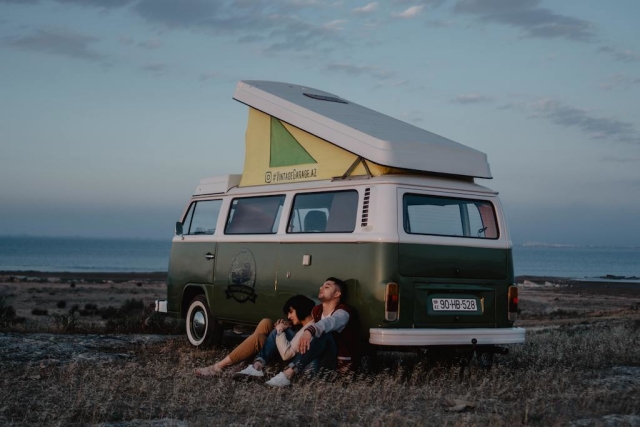Even before the pandemic, there were signs that change was needed in the travel industry. 2020 basically put a halt to all but essential travel, with hotels, monuments, airlines, museums and restaurants trying to reinvent themselves, repurpose their spaces and their services. Can the lessons of 2020 be used in 2021 to help build a concept of tourism that satisfies the traveler without being destructive to the planet and others? Episode 13 of The “After Calendar,” our trend book for 2021.
All of a sudden the skies were emptied of airplanes, trains were running nearly empty and everyone found themselves confined in their homes. The tourism industry essentially ground to a halt and our own identity as travelers or tourists was transformed, shaken. Under house arrest, we rediscovered the nature around us and the wonders of proximity. And these long months should profoundly change how we travel in 2021 and beyond.
Even before the pandemic there were signs that change was needed in the travel industry. But instead of a gradual progression of growing awareness among tourists of the environmental impact of their practices after the “flygskam” movement and a progressive uptake in sustainable tourism by the industry, international tourism came to a standstill.
The term “anthropause” — referring to this period of significantly reduced human activity — was coined largely in response to the unprecedented drop in travel and the resulting drop in carbon emissions.
While our awareness of our impact as tourists, sometimes catastrophic, on environments and communities may have been growing since the concept of “overtourism” made headlines in 2018, 2020 made it essentially impossible to not look our behaviors in the face and understand that they have a very direct effect on shaping our planet.
Watching the outside world from the inside, through screens in our homes, reports of dolphins swimming in less polluted waters in Italy and near Istanbul may have been a temporary reason to cheer but also a call to reckoning in ourselves.
Scientists investigating the effects of this anthropause on ecosystems emphasize that with wildlife free and humans under lockdown, the relationship between people and nature is shifting. With nature a main draw for many travelers, this year we learned that wildlife observation isn’t only associated with an exotic or faraway location or even changing one’s environment. As we stayed at home, we started really looking at the nature around us.
The birdwatching boom of 2020 grew out of convenience as birds can be found nearly anywhere, even in urban areas, but it also meant that many of us started to view our own, nearby environments differently. Bringing nature into our everyday routine meant we could approach these surroundings with new eyes, a key trait for developing our new travel practices.
Leaving the skies for the birds
As for the airlines, planes remained grounded, like a symbolic vestige of our recent past. A desert parking lot in Alice Springs, Australia, is the storage site of over a hundred planes requiring regular maintenance and has become a kind of curiosity in itself.
At the same time in Singapore, grounded planes were transformed into restaurants where customers could reserve the opportunity to eat a travel-style meal and experience what it’s like to fly on Singapore Airlines Airbus’s A380. And so marketing initiatives like this and the well-publicized flights to nowhere may have been designed to spark excitement about travel but, as a simulacrum of a trip, in fact, they resembled a kind of “tour” of our recent past. Postcards from another pre-COVID time, or even another world.
Meanwhile a British company specializing in “no-fly” holidays aims to respond to our evolving demands: “wanting to avoid crowded airports, holiday closer to home, experience nature and support local businesses.”
As for hotels — what can a hotel offer us now? In the new configuration of our everyday reality, hotels tried to launch special rates and offers for those who wanted to make it their temporary home office for a while, a home office located elsewhere for the hybrid nomads who want to work with a different view and take advantage of the amenities and the surroundings. A pragmatic reinvention and one that saw the blurring of the boundaries between home (office) and holiday residence.
The journey inwards, at home
The reasons that we travel are multiple: we want a change of scenery, we want to explore something new and learn something, we want to try new foods, we want a social media brag, we want to make connections, we want to relax, we want peace, calm and quiet, we want to rediscover ourselves.
With levels of burnout soaring, particularly this year with the home office screens an omnipresent feature in our lives, this remains a key aspect of travel. Travel is often largely about our relationship with ourselves.
So instead of taking a local flight that goes nowhere, what if we could take an inner journey to somewhere? The lessons of the year 2020 have paved the way for such contemplation. Early in the pandemic, philosopher and author Alain de Botton tackled for the Financial Times the topic of how we can get some of the psychological, existential benefits of travel from an 8-minute walk or from reflecting on previous trips, how “we may already enjoy the very best that any place has to offer us simply by thinking about it.”
While this may have been written before anyone knew just how much of 2020 would be spent in lockdowns, it may help us better understand what we seek from the travel experience when we are once again unfettered. One of the themes to watch for 2021 for Pinterest is “dreams are the new escapes” — these voyages we take at home can prepare us for a different kind of travel, based on our own dreams and not filtered images showing up in social media feeds.
Backlash against travel influencers
Even before the pandemic, many influencers were being called out for staging their Instagram shots, while destinations’ promotional departments were also trying to navigate a fine line between working with the “right influencers” who build engagement and the “freeloaders.”
In September 2019, James Asquith asked in an essay in Forbes, “Have Instagram Influencers Ruined Travel For An Entire Generation?” arguing that “images became less about the destinations, and more about pretty and edited images” and “individual egos.”
The result is a disconnect between image and reality.
“We see all these amazing destinations and when we as the audience make that once in a lifetime trip to them, it leads to disappointment that said destination isn’t how we have been made to believe it looks like,” he noted.
The once-in-a-lifetime trip ends up being compared to the perfect Insta shot — and nearly inevitably doesn’t measure up, leading to disappointment. Too many people to get a clear view, wrong time of day, no filter.
But “the world isn’t perfect and that should be appreciated,” he pointed out. Look to be inspired by what’s right around you, not by the glossy Instagram shot — it’s a message that resonates even more now as the realities of lockdowns made fantasies posted by influencers glaringly irrelevant.
Slow travel, ‘detourism’ and staying still
So is there a way to travel better? Can we become tourists and travelers with a difference? This year’s loss of freedom of movement has prompted many travelers, like New York-based real estate agent and avid traveler Rob, 34, to do some soul-searching.
“This past year has shown us how fragile that freedom [to travel internationally] can be and I think for a long time afterwards I’m not going to take it for granted and I hope that my fellow travelers won’t either…” he said.
So is there a way to minimize our impact, perhaps by traveling less, and still get the benefits of travel? An experience that enriches our lives, speaks to us with purpose, offers us sanctuary?
In the last decade, slow tourism has been advocated by various players as a way to better respect the environment and community of our travels, with several destinations even promoting themselves that way.
It is taking time to immerse ourselves in our surroundings, explore what is nearby, eating local, supporting local craftspeople, focusing on experiences instead of hopping on a plane to consume a beach vacation across the world as one would a fast food meal, as described by travel anthropologist Saskia Cousin.
Slow travel is about not taking a trip for granted, about noticing and, yes, going slower — though not necessarily for long periods or long distances. As this year comes to a close, there are signs that some in the industry are heeding this evolution, as it shows up in new initiatives around the world, including in Australia and India.
Another approach that could become particularly relevant in the post-COVID world is that of “detourism,” which is closely related and, according to French historian Sylvain Venayre, entails exploring your surroundings, often associated with being a tourist in your own area, and going with the flow, going where the day takes you and opening yourself up to chance encounters.
It’s about following the path less taken rather than heading off to the top tourism destinations in the world to simply tick off a checklist. It’s about having a more personal experience, not comparing what you see on your trip to what is in your social media feed.
While 2020 saw many people around the world travel locally, taking “staycations” — because they had no choice with borders closed — it could emerge as a more conscious choice.
A growing interest in sales and rentals of campervans could be one sign that such journeys are becoming increasingly attractive to a growing number of people. The lessons of 2020 regarding our relationship to nature, our surroundings, our inner travels and the reality of small, imperfect meanderings that give rise to real, lived experiences along a smaller, different, less trodden path could pave the way for us to become better tourists. CC
RELATED STORIES:
No ‘silver bullet’ solution: Tourism workers bear brunt of COVID-19 blow



